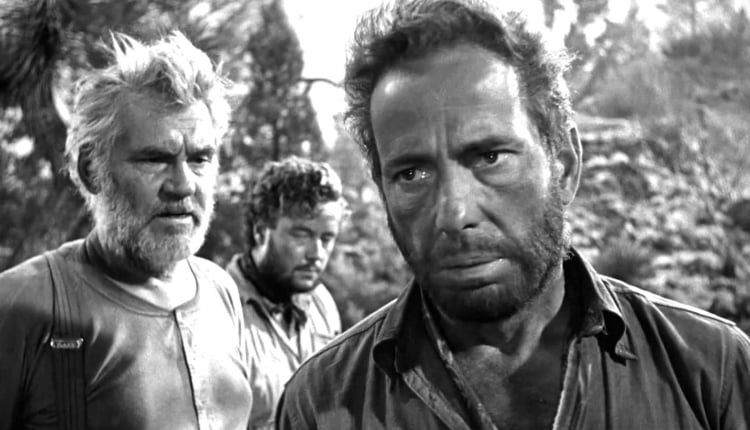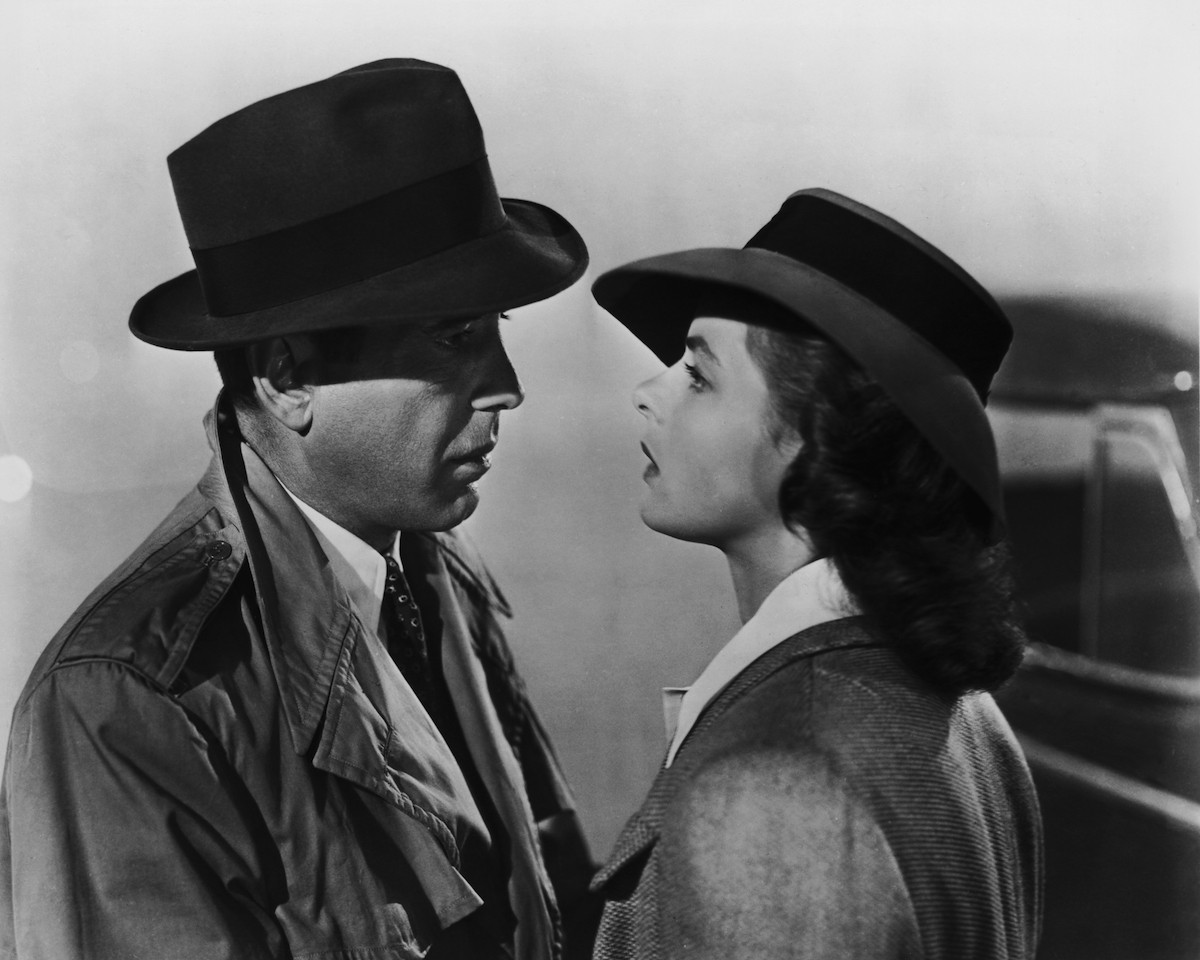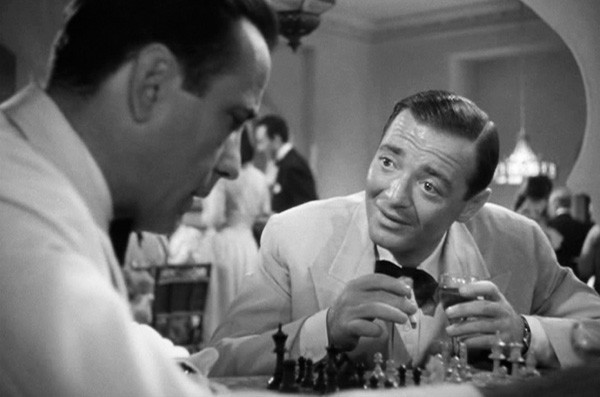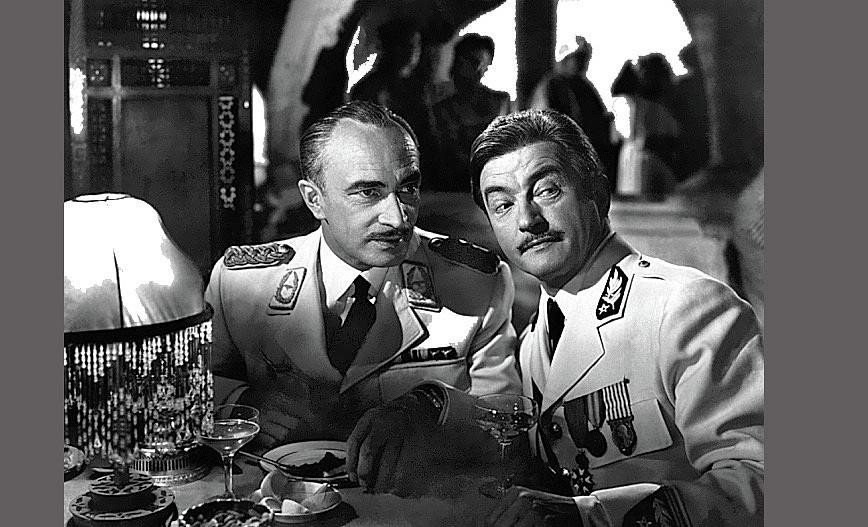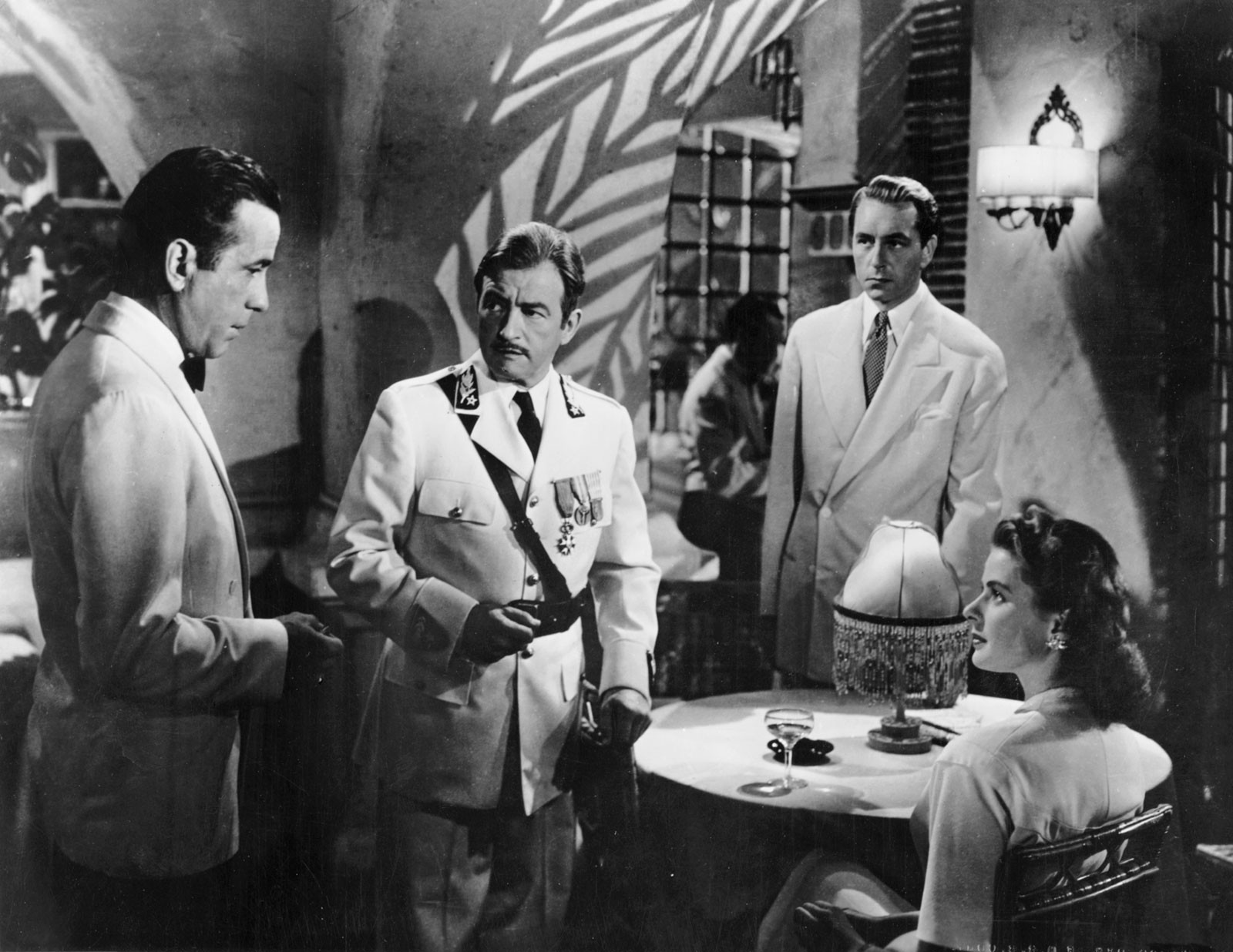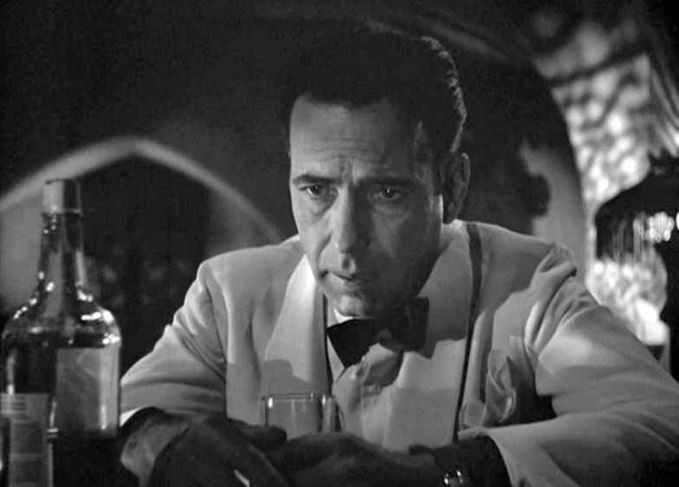It’s been a while, but “Never Seen It” is back, baby! In this highly irregular feature, I sit down with an interesting person and show them a well-known film that they have never seen before. Then we talk about it.
Billups Allen is the host of GonerTV and author of 101 Films You Could See Before You Die: A Film Guide for the Disenchanted. He chose The Treasure of the Sierra Madre, a 1948 classic directed by John Huston which stars Humphrey Bogart in the best performance of his storied career.
Chris McCoy: What do you know about The Treasure of the Sierra Madre?
Billups Allen: You know, it’s funny you asked, because I’ve had this movie on my list to watch, but I don’t really know much about it. I know that Bogart is in it, and I know the “stinking badges” line, and I know it’s kind of a heist movie.
126 minutes later …
CM: Billups Allen, you’re now a person who’s seen The Treasure of the Sierra Madre. What’d you think?
BA: Of course it was terrific. It’s a classic. Look at that, a hundred percent on Rotten Tomatoes! Not that that matters, but still, very few movies have that. I loved it.
CM: I love it, too. This is a desert island movie for me. It’s funny, this came out in 1948, and one of my other top five desert island movies, Out of the Past, came out the same year. I guess it was a great year for movies.
BA: When I was watching this, I was wondering what Westerns came out this year. Do you think of this as a Western in any capacity at all?
CM: Well, what do you think?
BA: It has a lot of the tropes of a Western. It has the bravado, but it’s not quite a Western.
CM: Tim Holt was a big Western star at the time. He was a star of B-movies, and this was the highlight of his career. So if you saw him in a movie in 1948, you would say, yeah, it’s a Western. But the late ’40s were the height of the noir movement. So it’s really structured more like a noir than it is like a Western.
BA: That’s true. I’m thinking of the shooting and stuff too, like, the way the shadows work.
CM: The look is definitely influenced by noir. I think this one of John Huston’s best looking pictures.
BA: Yeah, really. It looks great.
CM: I love The Maltese Falcon, but it’s very much staged like a play, and this is a lot more cinematic.
BA: It’s very cinematic in the desert scenes, when they’re all riding. I loved it when they see the bandits coming down the valley.
CM: Huston stays in their point of view. It’s not like, here’s a long shot, and then we’re gonna get a closeup of like Gold Hat the bandito on his horse, like you would do today.
BA: And you can feel that. It makes you feel sort of trapped. It is a theme through all this. You feel trapped yourself because even though you can see ’em coming, there’s nothing you can do. You just have to wait and see what they’re gonna bring. And in a situation like that, watching it, even with everything I know about movies, I didn’t fully know what was coming. I didn’t know if that was gonna be a fight, I didn’t know what it was gonna be. It’s like watching a snake come up the hill.
CM: Maybe one of the things that’s not Western about it is that the Indians are the good guys.
BA: Yeah, that’s what I mean. It’s a very early time in movies for that to be the case, you know?
CM: Like, 30 years ahead of its time!
BA: I think they play with that in the scene where they approach the fire and the first thing you see is the blade drop, like they’re preparing to swing those blades! But in the end, they were just holding them.
CM: That’s Huston directing your emotion by controlling what information you have. You see that it’s a blade, but you don’t see that the guy who is holding it.
CM: Here’s the big question: Is Fred C. Dobbs the hero of this film?
BA: Dobbs? Hmm … I don’t know if this is too out-there, but a lot of the time I was watching it, I was thinking about the three characters, they’re all doing things that I could have done. It’s like one person in three people, you know what I mean?
CM: Yeah, it’s like, sometimes you get paranoid, and sometimes you’re kind of like Walter Huston, like Howard.
BA: I saw Howard as the all-seer, you know what I mean? Then we have the middle, who is Curtin, and then we have Bogart’s character, Dobbs, who sort of dubious, you know what I mean? I wouldn’t think of him as the hero, but he’s like the protagonist of the film, though. I think they’re like the see no evil, hear no evil, speak no evil. They go together. You could see yourself reacting in any of these ways, depending on how you felt about it. And it’s all because of the how close they were to the treasure. So when the treasure got farther away, Howard was less attached to it. He had lived it, and was old enough or wise enough to know if it goes away, he’s gonna be okay. He kind of taught that down, but he only taught it to one of ’em. The other one died because of his greed and his inability to see the big picture. He was focused on the prize. How do you feel about him?
CM: I think Dobbs is the villain of the piece, but because he gets the most close-ups, and he’s Bogie, you assume he is gonna be the hero. Huston leads you along for the first half of the movie. It’s like, maybe he is a good guy, but then there’s always little flashes.
BA: Like when he throws the water in the kid’s face in the beginning.
CM: At one point near the end, you said, “He’s so mean!”
BA: I did say that. He was tough character.
CM: This is one of the most paranoid films ever made. The Parallax View has nothing on his film.
BA: The closer he got to being able to steal everybody’s gold, the more miserable he was, and the more he plotted with himself to try to get away with something. At one point, he crossed the line he couldn’t cross back from, when he shot Curtin.
CM: Tim Holt has one of my favorite scenes of all time. There’s a scene where Dobbs is in the goldmine, and there’s a collapse. Curtin walks up to the door of the mine, and he almost doesn’t help him. He almost walks away. Then he’s like, nah, I can’t be that guy. I feel like the same thing has probably happened to Howard like two or three times, you know? He’s been through it. He knows who he is. But there’s this moment when Curtin has to decide what kind of a guy he is, and he decides that, no, I’m not the kind of guy that kills people for money. I’m the kind of guy that works for the common good. And then Dobbs has that same moment, where he has to make the decision, and well, every time he has to make a decision like that, Dobbs chooses Dobbs.
BA: Absolutely. That’s why I think it’s interesting to watch it from a point of view of, ‘I could’ve gone either way myself,’ you know what I mean? I would like to think I’m the kind of person that would help Dobbs, but after some of the things he had done up to that point, you’re thinking the practicality of it would’ve have just been to leave him there. It is interesting in how it pulls you in so many directions.
CM: And then when Cody, the other guy, finds them … I think this is why I love film noir and I love John Huston. Everybody’s smart, and they’re all plotting against each other. Because in real life, people are stupid. Nobody really sits around and dissects the situation. It’s a very screenwriter thing to do, to sit around and dissect everybody’s motives. Cody is like, ‘Okay, here’s your choices: One, you can kill me. Two, you can cut me in. Or three, I can go to town and file a claim and throw you guys off your gold mine. I would choose two, but you guys gotta choose what you choose.’ And that’s exactly the moment you’re talking about. ‘Cause it’s like, I could see killing him, and I can see not killing him. It’s just a question of what kind of guy you are.
BA: Or how desperate you are to make what you’re doing work at that point. You know, if you’re early days in it, you might be more willing to share it, but the longer Dobbs is in it, the more he’s gonna work to keep what he has.
CM: He says, ‘I’m not gonna do that.’ He says at the beginning, we’re gonna make our goal, and then we’re going to get out. He has a chance in the beginning to make that choice, when they beat up the the deadbeat boss.
BA: He has a chance to take all the money there and he doesn’t do it. Corruption is a big theme.
CM: This film was based on a book by a a guy named B. Traven.
BA: I noticed that. Have you read the book?
CM: No. But nobody knows who B. Traven really was. It’s a pen name. All we know is that he lived in Mexico, and he was probably a Communist. There’s all these socialist themes that run throughout this film. For example, the first time you meet Howard, he is explaining his theory of value. Why is gold worth a lot of money? Because a lot of labor went into finding it. You know, the capitalist answer to “Why is gold worth money?” is that everything is worth whatever the market will bear. If people are stupid enough to want gold that bad, then we will sell it to you.
BA: I didn’t think about that. Walter thinks a hundred percent in terms of labor.
CM: The theme that that runs throughout it is, are you going to choose to work with the collective, or are you gonna choose your own selfish motives?
BA: When you put it that way, there really is a message there, isn’t there? Dobbs is the greedy capitalist.
CM: When we were watching it, you said something about symbolism. I was like, yeah, man, everything in this picture is symbolic.
CM: The one thing you knew going in was that line, “We don’t need no stinking badges!” It just kind of sneaks up on you, doesn’t it?
BA: You think you’re gonna see it coming, but you don’t. It just pops in there in a way, like a lot of those famous lines do, I guess.
CM: Because it’s so earned. That dude who was Gold Hat [Alfonso Bedoya], he was always the Mexican guy in Westerns and stuff. This was the role where he got to really have depth, and look: You got Walter Huston, who won Best Supporting Actor. You have freakin’ Bogart at the top of his game. But who does everybody remember? They remember the character actor.
BA: That’s the moment. I think Bugs Bunny referenced it, and it was in The Three Amigos. Down through the ages, it’s a classic.
CM: Walter Huston, absolute classic performance.
BA: He very much deserved to be nominated for that performance.
CM: He does the archetypal “crazy prospector dance.” I don’t know if it was the first one, but it’s the best one.
BA: Now that I’ve thought about the socialist aspects of it, one thing that came up twice was the virtues of fruit picking. It’s a simple life of hard labor that you’re supposed to strive for. Like, it was gonna be [Curtin’s] reward for doing this. And the other guy, the letter guy [Cody] could have had that already. But he walked away from it, and he got killed.
CM: All of these people are pursuing happiness — or at least that’s what they think they’re doing. Cody had what the film ultimately comes to define as happiness. He had that already, but he followed greed.
CM: One of the reasons I’m a big Huston fan is ’cause he’s so literary. This movie has like twice as much dialogue as a contemporary movie. It’s dense as hell.
BA: I feel like it had less soundtrack too, fewer music cues. It left you to figure things out. When the Gila Monster thing happened, there was a sharp music cue, and I thought, this is the first one I can remember.
CM: You’re absolutely right. A modern director would be trying to lead your emotions more. John Huston is not here to hold your hand through this. And if people speak Spanish in this movie, you better know Spanish, because he ain’t telling you what they’re saying.
BA: You could get the gist. I like that when movies do that a little bit, at least.
CM: Scorsese did that in Killers of the Flower Moon. It’s super effective in this movie, because you don’t feel like you miss anything, you understand what’s going on here. There’s an extended scene in Spanish at the end where the bandits get back to town. I don’t speak Spanish, but I know exactly what went on.
BA: I think it’s interesting that when they started, they were all expatriates. They never really say how they ended up in that situation, but I kind of like that. It makes the story kind of take place in limbo. The beginning reminded me a lot of the French movie where they moved the dynamite, they remade it with Roy Schneider.
CM: Sorcerer?
BA: That was the remake … [It’s The Wages of Fear, 1953] Both movies follow that structure. They start with these guys, and they’re just hanging around this company town with no jobs and no money. They get mixed up in this plot to move a bunch of dynamite that has melted to a point where it’s dangerous to be around. The rub is they could blow up anywhere along the line.
CM: So, it’s important that these are people out of their regular context.
BA: Right, they’re out of their element, without much hope of doing anything.
CM: It is structured like an experiment. All the major characters are guys. There are some women in the film, but they don’t really do much. This is not Bechdel Test compliant at all. But in a way, if one of our three heroes was a woman, it changes the dynamic. The whole thing is designed to remove all the variables until you get down to just greed. That’s what ultimately is motivating them — how they relate to their own avarice. One way or the other, it determines their actions. It’s really an exploration of greed. But if one of ’em was a woman, it would be different. If one of them was Mexican, it would be different. It would complicate things.
BA: I never even thought about it in the extreme, but it’s important that they’re all out of their element to begin with. They’re kind of put in this position where they have to figure something to do, but it’s gotta be unorthodox. They’re kind of trying to get out of where they are. They cannot just blend in.
CM: They try to blend in! Talk about another socialist theme, they tried to do regular hard work, and it’s all like ‘Oh, come on! Get with the team! We’re all family here! We’re working 18-hour-days building this family oil derrick!” You know, the first bad guy in the movie — and the only clear-cut villain in the whole thing is an oil man, right? He just flat out rips ’em off.
BA: Bogart is playing against his normal type. I know he’d played bad guys before, but he was particularly …
CM: Just nasty.
BA: Yeah, not only nasty. Devious to an almost modern point, beyond how things were written at that time
CM: He might as well be Dexter.
BA: It’s funny you just said that. ‘Cause I was thinking of Anthony Hopkins; paranoid and scheming almost to a Hannibal Lecter level. It’s compelling to watch him, because he’s unpredictable and it makes the film unpredictable. Has he been this way the whole time, and we just don’t see it until the situation brought it out? Or is the situation making him act like a maniac? Bogart’s maniacal performance was definitely special, I think.
CM: He does so much with his body. When Cody first shows up, Curtin and Howard are sitting around the fire, and their body language is very relaxed. “Let’s see who this guy is. We don’t have to jump to any conclusions.” But Bogie’s hovering over him, bowed up on him. Then later, when he and Curtin are by themselves, he’s like “Hey, we should steal Howard’s cut.” He is balled up, wrapped around himself in an absolute manic state. It’s a brutal performance.
BA: Especially because the image of him is so cool and collected in other movies.
CM: Nothing phases Rick Blaine.
BA Nothing gets to Phillip Marlow.
CM: Finally, when the banditos catch up with him, that scene really stood out to me this time, because it all plays out on his face. You can see him scheme, you can see the wheels turning, and you can see when he realizes it’s over.
BA: Then they figure out who killed him by who was wearing his boots later. I love that. That was great.
CM: Oh, the boots! Yes! That scene, right after Gold Hat and the two surviving banditos kill Dobbs, the whole movie plays out again in fast motion.There’s three of them, and they immediately turn on each other over the treasure. They’re sitting on $105,000, and they don’t even know it! They turn on each other over boots and a shitty hat.
